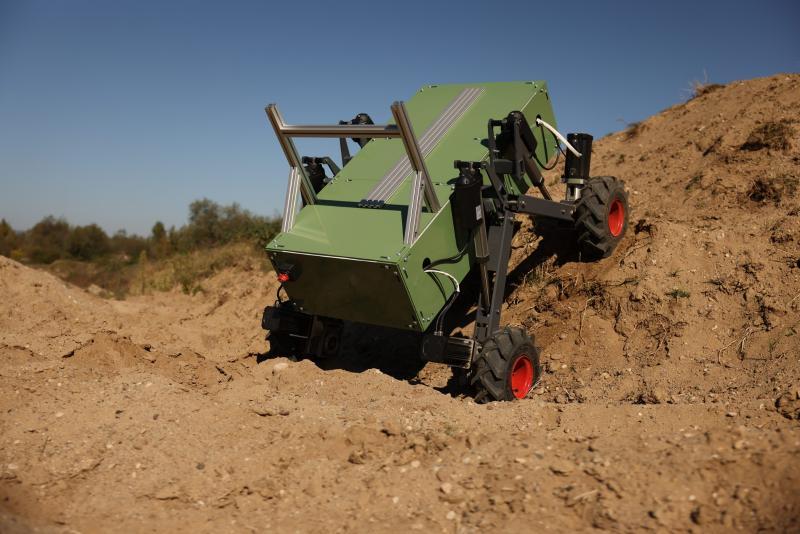Robot shepherds and robots that perform other farm tasks, such as picking strawberries, developed at the Science and Technology Park Niš will help Serbian farmers deal with a shortage of labour
People sometimes worry that robots will take their jobs. Thankfully, dogs don’t understand what robots are, otherwise they’d be worried too. Specifically, sheep dogs.
That’s because Coming Computer Engineering, a Serbian information technology firm, joined forces with engineers from the University of Niš’s Faculty of Mechanical Engineering to design a multifunctional, cutting-edge robot that addresses one of the largest obstacles for Serbian agricultural producers – the lack of available workers. It’s called the RoboShepherd.
“The RoboShepherd has been designed to revive traditional livestock farming, which includes raising cattle in a pasture,” says Dušan Krstić, the project manager at Coming Computer Engineering. “Since only a small workforce is available in agriculture, our aim was to replace people with robots. They will take the animals to pasture, safeguard them from predators, and ensure they graze just the right amount of grass.”
Robotic shepherds able to look after a herd of 620 sheep could become a common sight in Serbian pastures. Apart from these robots taking care of the livestock, Coming Computer is also developing robots to perform other agricultural tasks, such as planting, irrigation, picking and ploughing.

Reliable ally in the field
Unlike many machines, these electronic helpers can operate on extremely steep terrain.
“We have tested the prototype to pull 345 kilogrammes up a 30% incline, using an automatic levelling system,” says Nikola Velčev, a Coming engineer. “It enables the robot to lower its front part when it reaches the steep part of the slope. Otherwise, it would flip over every time it carries a large weight or tows a trailer”.
The robot can also operate at ground level, picking strawberries, say, and instantly adjust its robotic platform to raise its arm up to 2 meters in height.
“Our goal is to develop a platform that’s able to integrate add-ons for different activities,” Velčev explains. “The robot is controlled with a joystick, with sensor-supported movement that’s able to detect obstacles and avoid them. Thanks to GPS navigation, it will be able to come back from the pasture to the stable completely autonomously.”
The robots are going into production over the next three years with a price intended to make it affordable for small agricultural producers. Currently, these kinds of robots cost over €100 000, putting them out of reach for most farmers in Serbia and the region.

Raising the bar in high-tech farming
It would normally take five to ten years to develop such unique artificial intelligence-based agricultural solutions, even at global high-tech companies operating in big information technology hubs like Silicon Valley. Innovators from the Science-Technology Park in Niš have done it in a mere three years, thanks to support from the Republic of Serbia’s Innovation Fund and the European Union.
Coming Computer Engineering is one of many companies operating in the Science-Technology Park in Niš, an innovation hub opened in 2020. The Park has become a regional center for the development of innovative science and technology projects – and their international promotion. It works closely with the university and the academic community, bringing over 500 young IT engineers together to help position the region as a global center for advanced technologies.
“The essence of the Park is the creation of a community of innovative companies, which can exchange know-how, support each other and participate in activities the park is organizing,” says Milan Ranđelović, director of the Science-Technology Park. “The aim is to support local high-tech entrepreneurs, as well as to raise awareness and strengthen the entire innovation ecosystem in the region.”
The companies located in the Park, together with its virtual members, employ around 5 000 people.
The Science-Technology Park’s building was constructed with funds from the Serbian government and a European Investment Bank loan signed in 2010 for the research and development sector in Serbia.
- Read about the science park in Belgrade
Competitive career development opportunities for the most gifted
In the Western Balkans, EIB Global, the EU bank’s arm for operations outside the European Union, unlocked €415 million since 2005 for education, as well as research and development projects that contributed to the construction, renovation and digitalisation of education and scientific facilities.
“Innovation is a key impetus for economic growth, facilitating solutions for better quality of life and more equitable societies,” says EIB Vice President Lilyana Pavlova. “We are happy to see the development and results in Serbia’s R&D sector, which the EIB has supported by investing €200 million for the modernisation and rehabilitation of research laboratories, faculties and scientific facilities, providing generations of Serbian scientists and students with better learning and working conditions.”
“Over the couple of years since their opening, the Science-Technology Parks in Niš, Belgrade and Novi Sad have demonstrated their contribution to the development of innovation platforms, know-how and innovation capital in the region. All these infrastructure improvements should provide young and talented people with the career opportunities available in more developed economic environments,” Pavlova adds.
EU bolsters R&D in Serbia
Combined with the EIB financing, support from the European Union for innovation and competitiveness in Serbia reached over €400 million since 2010 in cooperation with the Serbian government. These funds also connected the country’s tech sector to European and international scientists and entrepreneurs. Since 2014, Serbia has been a beneficiary of the European Commission’s research and funding programme, Horizon Europe.
“We have financed 137 projects from a variety of sectors and we already reserved additional funds so that our overall funding will jump in the future to an impressive €46.8 million for grants for innovators in Serbia.” says Emanuele Giaufret, head of the EU delegation in the Republic of Serbia. “It is important as it contributes to the transformation of the economy to a much more knowledge-based and more digital economy.”
